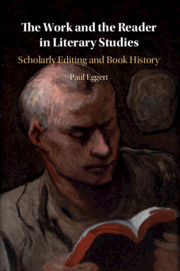Book contents
- The Work and the Reader in Literary Studies
- The Work and the Reader in Literary Studies
- Copyright page
- Dedication
- Contents
- Figures
- Preface
- Chapter 1 Introduction
- Chapter 2 Reviving the Work-Concept
- Chapter 3 The Digital Native Encounters the Printed Scholarly Edition Called Hamlet
- Chapter 4 The Reader-Oriented Scholarly Edition
- Chapter 5 Digital Editions
- Chapter 6 The Work, the Version and the Charles Harpur Critical Archive
- Chapter 7 Book History and Literary Study
- Chapter 8 Book History and Literary Study
- Chapter 9 Adaptation, Folklore and the Work
- Chapter 10 Conclusion
- Notes
- Bibliography
- Index
Chapter 4 - The Reader-Oriented Scholarly Edition
Published online by Cambridge University Press: 19 August 2019
- The Work and the Reader in Literary Studies
- The Work and the Reader in Literary Studies
- Copyright page
- Dedication
- Contents
- Figures
- Preface
- Chapter 1 Introduction
- Chapter 2 Reviving the Work-Concept
- Chapter 3 The Digital Native Encounters the Printed Scholarly Edition Called Hamlet
- Chapter 4 The Reader-Oriented Scholarly Edition
- Chapter 5 Digital Editions
- Chapter 6 The Work, the Version and the Charles Harpur Critical Archive
- Chapter 7 Book History and Literary Study
- Chapter 8 Book History and Literary Study
- Chapter 9 Adaptation, Folklore and the Work
- Chapter 10 Conclusion
- Notes
- Bibliography
- Index
Summary
Chapter 4 argues that calls for crowdsourcing digital scholarly editions have misconceived the nature of the scholarly edition and its changing relationship to its readers. The relationship is argued to be essential. A survey of post-war scholarly editions reveals a shifting understanding amongst editors of the needs and capacities of readers. However, an increasing tolerance for the reporting of variant readings has come at the cost of shrinking print runs (some figures are provided). The digital environment is argued to offer a solution by putting into operation a distinction between the archival and editorial functions of the scholarly edition. The latter should henceforth be understood as an argument directed at the reader about the archive. This conception is shown to open the way for editors to transgress those literary-historical and literary-critical domains where, because of the 100-year horizons of print editions, editors have traditionally been reluctant to tread.
Keywords
- Type
- Chapter
- Information
- The Work and the Reader in Literary StudiesScholarly Editing and Book History, pp. 64 - 79Publisher: Cambridge University PressPrint publication year: 2019

